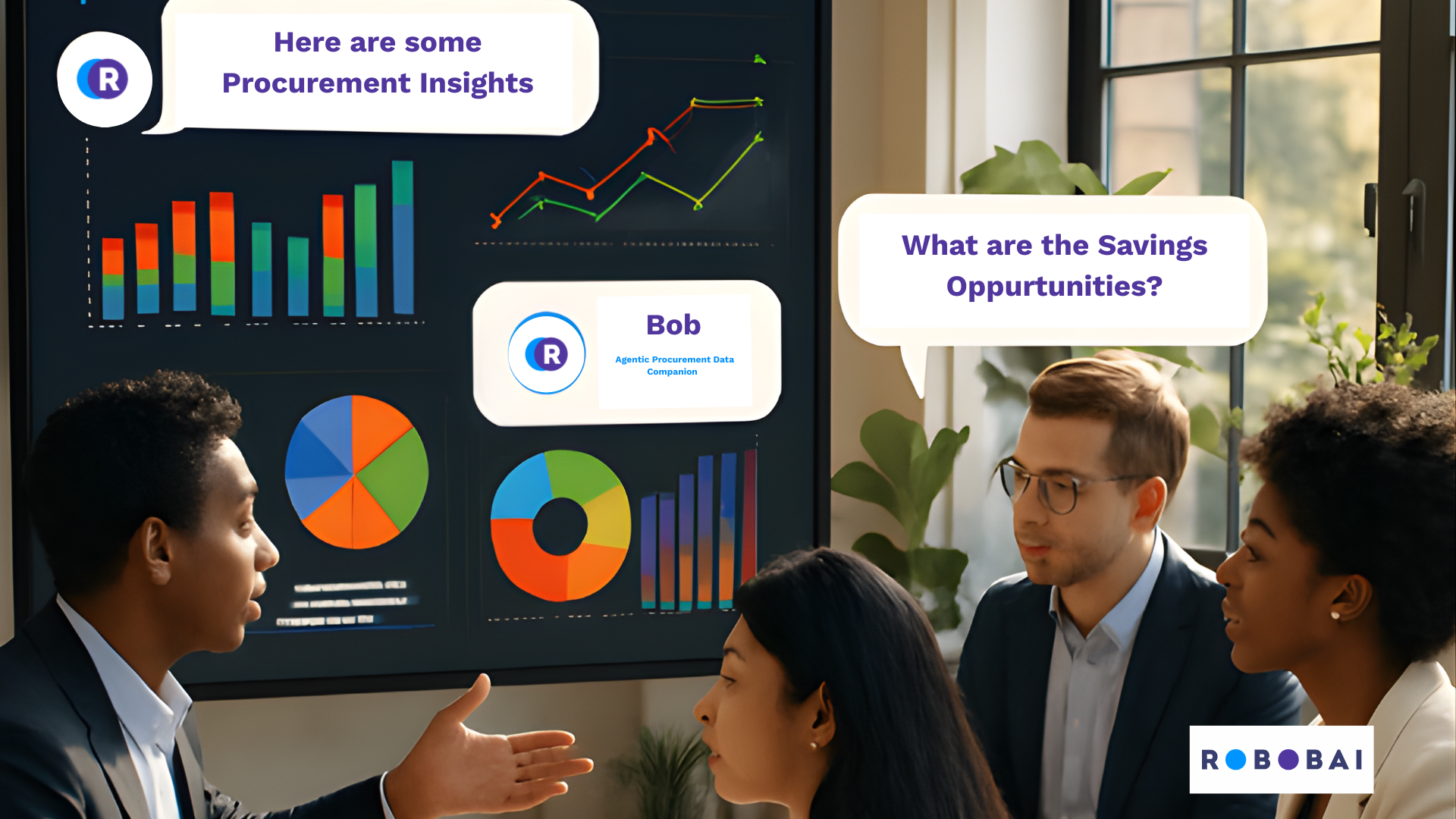Reshoring: Transforming Global Supply Chain Management with Innovative Technology Solutions
In the wake of the COVID-19 pandemic, a significant shift is occurring in global manufacturing and supply chain operations.

RobobAI looks at spend analysis and procurement optimisation
RobobAI uses AI technology to sculpt data into a clear vision of how organisations manage their supply chain and improve company's decision-making ability
As businesses look to stay competitive and efficient, the use of AI-integrated spend analytics software has become a critical component of spend management.
The potential of the technology to uncover hidden insights and improve operations is well regarded, as companies are now on a journey from understanding the potential on offer to leveraging it. This shift in thought needs not only a strategic vision but also planning and execution to a fine detail.
RobobAI is trusted by companies like American Airlines, Coca-Cola Europacific Partners, and Walmart with its ability to give businesses the ability to more clearly manage the supply chain – helping with everything from 360 degree visibility of supply chain spend, indigenous supplier reporting and modern slavery and sanctions reporting on suppliers.
RobobAI looks at spend analysis and procurement optimization is catching the attention of other large enterprises who are looking to enhance their operational efficiency and reduce costs in an increasingly complex global marketplace.
“The key business challenge we aimed to solve was to provide 360-degree visibility over the spend data of large organizations,” Nitin Upadhyay, RobobAI’s Chief Data and Innovation Officer, told PYMNTS.
“By harnessing AI, RobobAI can rapidly consolidate, classify, and categorize vast amounts of spent data, offering insights that were previously difficult or impossible to obtain through traditional methods.”
AI-Driven insights yield savings
RobobAI-driven platform has already shown results for its clients, according to Upadhyay, a typical organization spending US$1bn annually on goods and services can realize savings of up to US$6-8m annually by adopting the insights generated by their platform. These savings come from various areas, including operations optimization, payment restructuring, and contract expansion opportunities.
Nitin shared an example of a client that identified a 52% reduction opportunity in purchase orders, leading to substantial cost savings while maintaining operational excellence. He said this level of optimization can be particularly impactful in industries with tight profit margins or those facing increased competitive pressures.
Another client uncovered the potential to transition 33% of their suppliers to commercial card transactions, simplifying payment processes and improving cash flow management. Such insights can provide a significant competitive advantage in an economic environment where cash flow is king.
RobobAI’s platform aided one client to find contract opportunities with US$98m from tail suppliers – smaller vendors that are often flying under the radar in traditional spend analysis. The show's AI can be used to uncover those hidden values that are areas that human analysts may overlook.
It is also helping clients tackle the perennial problem of unclear expenditures. In one case, the company's AI-powered analysis uncovered US$1bn in expenditures with blank invoice descriptions, providing an opportunity for the client to gain a deeper understanding of their expenses and identify additional cost-saving measures.
Implementing AI in supply chain management has its challenges. With challenges from taking the raw data and making it useful for the company, which is still a barrier for those looking for successful AI implementation.
Overcoming these hurdles requires sophisticated techniques and tools, especially when dealing with large, complex datasets from multiple sources.
This particular issue is particularly acute in supply chain management, where data often comes from a multitude of systems, suppliers, and geographies. RobobAI’s success in this area shows how its AI models and data processing capabilities are sophisticated.
Another problem is scalability as datasets grow in size and complexity. AI systems are required to process and analyze data efficiently without performance degradation. RobobAI has invested heavily in developing scalable infrastructure to meet this challenge, allowing it to serve large global organizations with complex, multi-tiered supply chains.
RobobAI has expanded the type of data it can analyze, providing even more comprehensive insights to its clients, as it has grappled with unstructured data – such as text, images, and videos, which need more advanced AI techniques to analyze effectively.
How RobobAI helped Coca-Cola
Coca-Cola Amatil (CCA) partnered with RobobAI to enhance their spend analytics across six countries and multiple ERP systems, as they faced challenges in consolidating spend data, improving classification granularity, and enhancing supplier analysis and compliance measurement.
Coca-Cola Amatil was an Australian bottler of non-alcoholic beverages that existed from 1904 to 2021, when it merged with Coca-Cola European Partners to form Coca-Cola Europacific Partners.
To address these issues, RobobAI centralized all spent data and implemented an AI-driven solution that classified line-level data using the UNSPSC taxonomy. This approach provided CCA with a 360-degree view of supplier spend through an easy-to-use platform, enabling teams to generate spend reports on demand and consolidate suppliers more effectively.
Additionally, RobobAI co-developed a sustainability dashboard that allowed CCA to track progress on supplier commitments. The improvements resulted in enhanced spend visibility and reporting capabilities, empowering Category Managers to identify opportunities within their categories more easily.
The flexibility of the RobobAI platform accommodated various reporting requirements across the business, and its ease of use led to increased adoption and usage among team members compared to previous analytics platforms. Ultimately, this transformation drove greater insights and decision-making capabilities for CCA.
The future of AI in supply chain management
All businesses know the difficulty of operating today. The current procurement market, marked by geopolitical conflicts, energy crises, and climate challenges, has been dubbed a ‘poly-crisis’ by experts. This has shown the vulnerabilities of traditional supply chains.
AI can offer companies the opportunity to access and process vast amounts of data and find those patterns that people may miss, which is vital for predicting disruptions and optimizing operations in real-time. However, observers say the transition to AI-driven supply chains is challenging.
As AI continues to evolve, RobobAI is looking to expand its offerings. The company plans to provide direct access to its AI models, allowing customers to more easily benefit from their own finance and procurement data. This move towards democratizing AI capabilities could potentially accelerate the adoption of AI in supply chain management across industries.
Read more here.
This article originally appeared in Procurement Magazine. Read the source article here.
RobobAI brings unprecedented spend visibility to modern businesses. Our platform provides granular insights into organizational spend, empowering leaders to make strategic decisions and identify cost-saving opportunities across their entire operation.

In the wake of the COVID-19 pandemic, a significant shift is occurring in global manufacturing and supply chain operations.

AI is transforming how businesses streamline their supply chain operations to achieve greater cost savings.

Procurement analytics has relied for decades on spreadsheets, static dashboards, and manual reporting. Teams spent hours running extracts, building...